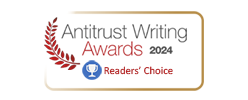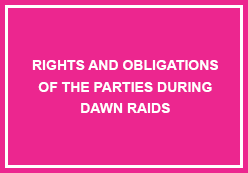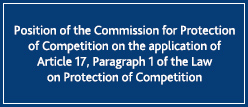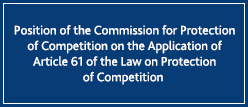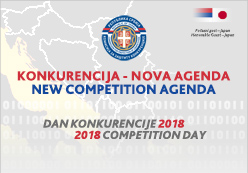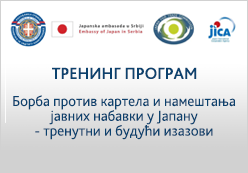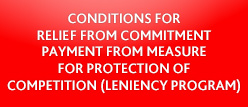 By concluding a contract for the use of public railway infrastructure with the “Kombinovani prevoz d.o.o.” company from Belgrade, the “Infrastruktura železnice Srbije” company has complied with commitments from the Resolution on suspension of procedure of the Commission for Protection of Competition, to sell railway routes to carriers who fulfill conditions related to the access to public railway infrastructure.
By concluding a contract for the use of public railway infrastructure with the “Kombinovani prevoz d.o.o.” company from Belgrade, the “Infrastruktura železnice Srbije” company has complied with commitments from the Resolution on suspension of procedure of the Commission for Protection of Competition, to sell railway routes to carriers who fulfill conditions related to the access to public railway infrastructure.
This contract also enables access and use of public railway infrastructure to other business entities interested in performing services of railway transportation of goods that previously have not been part of “Železnice Srbije“ company. Namely, railway traffic in Serbia so far has been run by „Železnice Srbije“ company, which has been restructured into three newly established railway companies – for passenger and cargo transport, “Srbija voz” and “Srbija Kargo”, respectively, and for public railway infrastructure management, “Infrastruktura železnice Srbije”.
„Kombinovani prevoz” from Belgrade is the first carrier who leased a route following “Železnice Srbije“ restructuring and initiated running operations using the public railway system, thus creating conditions for establishing of effective competition on the market of access to public railway infrastructure, which was the goal of initiated proceeding by the Commission.
During the first trail run held on June 2, the train composition of “Kombinovani prevoz” ran Kragujevac-Lapovo route.
 The 8th Sofia Competition Forum held beginning June in the Bulgarian capital city, traditionally gathered representatives of the national competition authorities from the Balkans.
The 8th Sofia Competition Forum held beginning June in the Bulgarian capital city, traditionally gathered representatives of the national competition authorities from the Balkans.
Forum participants coming from Albania, Bosnia and Herzegovina, Croatia, Montenegro and other regional countries, but also competition authorities’ representatives from Germany, Japan, France, Austria, Italy, Portugal, Slovenia, Russia, Turkey, alongside speakers from organizations such are the UNCTAD and OECD, European Union Court of Justice, European Commission, reputable international experts for competition policy, as well as legislators and representatives of the academic community, exchanged experiences related to the competition law and policy implementation. The Forum seeks to encourage cooperation and development of regional relations, thus ensuring uniform application of competition-related rules.
At the Forum, Serbian Commission for Protection of Competition was represented by the Head of the Restrictive Practices Division, Mr. Čedomir Radojčić, one of the most prominent forum panelists. Attached is the representative’s presentation from the Sofia Competition Forum.
 Representatives of the Commission for Protection of Competition of the Republic of Serbia, following an invitation of the Romanian Competition Council, visited Turnu Severin from June 8-10, 2016. The bilateral meeting, based on previously signed Memorandum of Cooperation between the two authorities, has been organized in the form of a roundtable for discussing numerous topics that have been jointly delegated.
Representatives of the Commission for Protection of Competition of the Republic of Serbia, following an invitation of the Romanian Competition Council, visited Turnu Severin from June 8-10, 2016. The bilateral meeting, based on previously signed Memorandum of Cooperation between the two authorities, has been organized in the form of a roundtable for discussing numerous topics that have been jointly delegated.
The meeting was also utilized so than Romanian competition authority’s representatives could present a platform they have established, related to the treatment of initiative applicants and “whistleblowers”, bid rigging cases, cartels in the oil and oil derivatives sector, and sectoral analysis. During the meeting, the concrete forms of cooperation between the two institutions in reference to the mentioned fields are also taken into consideration.
Serbian and Romanian delegations were led by the Commission’s President, Miloje Obradović, PhD, and the Council’s President, Bogdan Marius Chiritoiu, respectively, in addition to Council’s members, secretaries and professional administrative service representatives.
 Representatives of the Commission for Protection of Competition of the Republic of Serbia visited Rome during the three-day study visit to the Italian competition authority (Autorità Garante della Concorrenza e del Mercato). The study visit was organized as a part of a program support provided by „TAIEX“ – Technical assistance and information exchange instrument of the Directorate-General for EU enlargement.
Representatives of the Commission for Protection of Competition of the Republic of Serbia visited Rome during the three-day study visit to the Italian competition authority (Autorità Garante della Concorrenza e del Mercato). The study visit was organized as a part of a program support provided by „TAIEX“ – Technical assistance and information exchange instrument of the Directorate-General for EU enlargement.
During the study visit, a regulatory framework of the Republic of Italy competition law was presented, with particular emphasis on: determining infringement of competition in public procurement procedures; implementation of advocacy institute; implementation of leniency program and penalties for undertakings; practice in cases of conditional approval of concentration; implementation of economic analysis on competition regulation in specific sectors (free-lance professions, sport, burial services, banks, insurance).
The goal of this study visit was to improve knowledge and skills from the most important areas of competition law (restrictive agreements, abuse of a dominant position, economic analysis, control of concentrations), by informing from the examples of best practices and case studies of the Italian competition authority.
 The second day of the international conference “Institution Building of the National Competition Authorities in South-East Europe”, organized by the Commission for Protection of Competition of the Republic of Serbia in cooperation with the European Bank for Reconstruction and Development and with the technical support of the Center for Liberal-Democratic Studies (CLDS), was dedicated to the role of economics in the implementation of competition policy. An important role in this, as well as many other matters related to the implementation of competition policy, is played by a high quality economic analysis.
The second day of the international conference “Institution Building of the National Competition Authorities in South-East Europe”, organized by the Commission for Protection of Competition of the Republic of Serbia in cooperation with the European Bank for Reconstruction and Development and with the technical support of the Center for Liberal-Democratic Studies (CLDS), was dedicated to the role of economics in the implementation of competition policy. An important role in this, as well as many other matters related to the implementation of competition policy, is played by a high quality economic analysis.
During the conference, four panels were held which presented the experiences and economic tools in the process of market analysis, the determination of competition infringements and control of concentrations.
Notable presentations were given by Russell Pittman from the US Department of Justice, who presented the three most widely used economic instruments in the analysis of competition infringements, and Gregor Langus from the European Commission, who spoke about why economic analyses are the main tool in the effective policy of competition protection. Jelena Grahovac from the Economic Analyses Division of the Commission for Protection of Competition of the Republic of Serbia presented the experience of the Commission employees following the first economic and econometric trainings. The head of the Economic Analyses Division, Siniša Milošević, PhD, gave a speech on the “Analysis of price movement as a tool in defining the relevant market”, while Dajana Muženič-Abramovich from the Slovenian Competition Protection Agency spoke about the quantitative economic tests for defining the relevant market. Radu Paun from the Competition Council of Romania acquainted the participants of the conference with the economic instruments applied by this body in the context of measuring competitive pressure in the selected sectors of the economy. Gazmir Mani from the Albanian authority presented a case of abuse of dominant position in the mobile telephony market. Kim O’Sullivan from the EBRD provided a view of the role of economics in law and policy of competition protection as a way to improve the investment climate in the region.
 In addition to the aforemntioned economic tools, competition authorities often use instruments for monitoring the market (such as sectoral analysis, studies, reports, research, etc.) with the aim of identifying possible weaknesses in the market and/ or the existence of conditions of competition infringements.
In addition to the aforemntioned economic tools, competition authorities often use instruments for monitoring the market (such as sectoral analysis, studies, reports, research, etc.) with the aim of identifying possible weaknesses in the market and/ or the existence of conditions of competition infringements.
 The Commission for Protection of Competition of the Republic of Serbia has, in cooperation with the European Bank for Reconstruction and Development and with the technical assitance of the Centre for liberal-democratic studies (CLDS), organized an international Conference on Institution Building of the National Competition Authorities in South- East Europe.
The Commission for Protection of Competition of the Republic of Serbia has, in cooperation with the European Bank for Reconstruction and Development and with the technical assitance of the Centre for liberal-democratic studies (CLDS), organized an international Conference on Institution Building of the National Competition Authorities in South- East Europe.
The Conference was opened by the President of the Commission for Protection of Competition, Miloje Obradović, PhD, the director of the EBRD for Serbia, Daniel Berg and the head of the Negotiating team for the Accession of the Republic of Serbia to the EU, Tanja Miščević.
The President of the Commission for Protection of Competition, Miloje Obradović, PhD, has emphasised that, after years of recession, the national competition authorities do not have the right to a mistake, that they must secure free application of the competition rules and intervene only to the extent and manner necessary to ensure consumer welfare.
”I believe that the only solution may be obtained through the build-up of institutional capacities of the bodies for protection of competition so that they would be enabled to, based on economic parametres, act as objectively as possible. What we need are new tools and instruments for assessing the market and behaviour of its participants. Also, what is important is the performance of relevant sector inquiries, the topic which we will, to my pleasure, discuss tomorrow.”
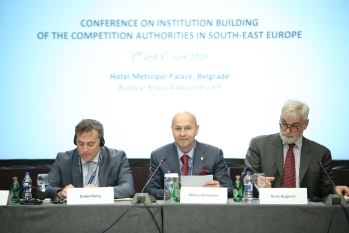 President Obradović has further stated that he believes there is significant room for improvement of the institutional capacities of the national competition authorities in the region.
President Obradović has further stated that he believes there is significant room for improvement of the institutional capacities of the national competition authorities in the region.
”The exchange of experiences which contribute to the alignment of practice, as a necessity in the times of interconnected markets and globalization, as well as the presentation of new tools, procedures and legal solutions shall, without doubt, be the required step further in the fight against the increasingly subtle attempts at competition infringements, which we get to witness every day.”
The director of the EBRD for Serbia, Daniel Berg, has expressed his support for engagement and role of the national competition authorities and emphasised the importance of the fact that Serbia has a Commission which is capable of facing the challenges in creating equal conditions for all the market participants. These kinds of gatherings are, according to Berg, of crucial significance since they provide for an exchange of experiences which will improve the functioning of the all competition authorities in the South-East region of Europe.
”If the market is regulated, the conditions for economic growth and society welfare are in place. If the grey market has a larger share, the probability of criminality rise is higher”, it was concluded by Berg, who also added that the EBRD and other international institutions are making a strong contribution and efforts to enhance the regulatory framework in order to improve the investment climate in those countries.
In that sense, Serbia is extremely successful, in the opinion of Berg, since it has a set of economic laws in place which improve the conditions for its competitiveness.
The head of the Negotiating team for the Accession of the Republic of Serbia to the EU, Tanja Miščević has stated that Serbia will not face larger problems in negotiating Chapter 8 with regard to competition issues.
”When it comes to protection of competition, the position of Serbia shall, thanks to the quality of the work performed by the Commission for Protection of Competition, not be problematic. Nevertheless, state aid is also a part of this negotiating chapter and this is where matters will be a lot more complex.”
She made a remark that the Commission for Protection of Competition is a good example of the functioning of an independent body, even though such bodies were mainly unknown in the countries with transition economies.
The Conference was also attended by renowned panelists such as Russell Pittman, PhD, of the US Department of Justice, Lorenzo Ciari of the EBRD, Gregor Langus of the European Commission and many other international and local experts in this field, representatives of the legal profession, as well as the business and academic community in Serbia.
Media support of the Conference was provided by the N1 television, Fonet agency, as well as the Nedeljnik and Nova Ekonomija magazines.
 The President of the Commission for Protection of Competition, Miloje Obradovic, Phd, with the members of the Councel of the Commission, has received Dimitri Loukas who is the Vice-President of the Commission for Protection of Competition of Greece.
The President of the Commission for Protection of Competition, Miloje Obradovic, Phd, with the members of the Councel of the Commission, has received Dimitri Loukas who is the Vice-President of the Commission for Protection of Competition of Greece.
In order to promote the further cooperation of these two institutions the topics of disscussion were the exchange of experiences in the field of the legislative framework and also the implementation of the policy of the Protection of Competition.
Obradović and Loukas agreed that there will be further steps in the collaboration which would allow the policy of the Protection of Competition to be even more efficient in this part of Europe. The activities that follow will provide for the Serbian Commision for the Protection of Competition to be even closer to European standards in the field of Law and the Policy of the Protection of Competition, which are an essential part of the negotiating process for accession to full membership in the European Union.
 The honored guest of Commission for the Protection of competition was Russell Pittman, Phd, the director of the Department for Economic Analysis of the US Department of Justice. who is one of the leading experts on the issues of protection of competition.
The honored guest of Commission for the Protection of competition was Russell Pittman, Phd, the director of the Department for Economic Analysis of the US Department of Justice. who is one of the leading experts on the issues of protection of competition.
Dr. Pittman held a useful lecture for employees of the Commission about using econometrics in market analysis, as well as experience in implementing competition policy in the United States.
Dr. Pittman will participate at the panel “The Role of Econometrics in the implementation of the Law on Protection of Competition” within the International Conference „Institution Building of the National Competition Authorities in South-East Europe” which will be held on June 2nd and 3rd 2016, in Belgrade in collaboration with the European Bank for Reconstruction and Development.
The lecture was attended by the members of the Council of the Commission, heads of division and employees of the Commision.
